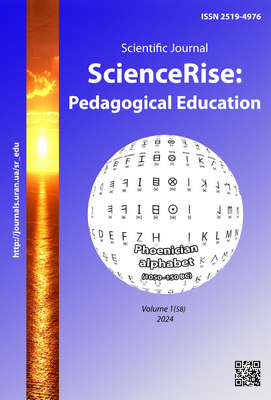Features of scientific research work of future aviation specialists
DOI:
https://doi.org/10.15587/2519-4984.2024.298544Keywords:
research work, aviation specialists, practical training, technologies and methods of scientific researchAbstract
The article presents the peculiarities of research work of future aviation specialists. It is noted that higher education institutions in the aviation field pay considerable attention to ensuring the scientific and research component of the use of modern educational technologies for the professional training of future specialists. The purpose of the study was the analysis and peculiarities of the research work of aviation institutions of higher education, aimed at the formation of research skills and professional skills.
The methods of research were the analysis and generalization of scientific literature on the organization of research work in higher education, ICAO documents regulating the flight safety management system for air transport.
Features of research work for students of higher education at aviation institutions are singled out, in particular: application of the problem-based learning method through the analysis of aviation regulatory documents and investigation materials of aviation events; simulation of real professional situations through a business game (imitation simulation), where the student is given the opportunity to be a pilot, air traffic controller, dispatcher-instructor, aviation shift leader, etc.; student conferences as an opportunity to present professional research work; simulator (practical) training; the practically oriented character of the educational program – the involvement and use of the work experience of aviation specialists-practitioners.
The criteria for ensuring the effective organization and implementation of research work of future aviation specialists are summarized, which is the complexity, consistency and comprehensiveness of learning and use of methods and technologies of conducting scientific research, implementation of their results, the continuity of research work according to training courses, the logic of the complication of methods, types and forms of scientific creativity
References
- ICAO Uniting Aviation. Available at: https://www.icao.int/Pages/default.aspx Last accessed: 10.02.2024
- Human Factors Training Manual: Doc# 9683-an/950 – Hardcover. Available at: https://www.abebooks.com/9789291940905/Human-Factors-Training-Manual-Doc%23-9291940909/plp Last accessed: 10.02.2024
- Shopa, Ya. I., Konopelnyk, O. I., Ftomyn, N. Ye.; Yakibchuk, P. M. (Ed.) (2013). Studentska naukova robota. Lviv: LNU imeni Ivana Franka, 100.
- Slovnyk ukrainskoi movy. (1970–1980). Instytut movoznavstva. Kyiv: Naukova dumka.
- Zhuk, L. (2017). Scientific research in universities: nature, importance and perspectives. Journal of Lviv Polytechnic National University. Series of Economics and Management Issues, 4 (873 (5)), 146–153. https://doi.org/10.23939/semi2017.01.146
- Kosheleva, N. H. (2019). Osnovy naukovykh doslidzhen. Bakhmut, 117.
- Rosowsky, D. (2022). The Role of Research at Universities: Why it Matters. Available at: https://www.forbes.com/sites/davidrosowsky/2022/03/02/the-role-of-research-at-universities-why-it-matters/?sh=456c8e2e6bd5 Last accessed: 09.02.2024
- Teichler, U. (2015). Higher Education Research in Europe. The European Higher Education Area, 815–847. https://doi.org/10.1007/978-3-319-20877-0_50
- Tyshchenko, V. (2017). Shchodo perspektyvnykh metodiv navchannia. Naukovyi visnyk Lotnoi akademii. Seriia: Pedahohichni nauky, 1 (1), 393–396. Available athttps://europub.co.uk/articles/-A-290489
- Baranova, Yu. V. (2019). Readiness for scientific research activity formation of future foreign language teachers. National Pedagogical Dragomanov University. Available at: https://npu.edu.ua/images/file/vidil_aspirant/dicer/D_26.053.01/dis_Baranova.pdf
- Mykhailov, V. M. et al. (2014) Metodolohiia ta orhanizatsiia naukovykh doslidzhen. KhDUKhT, 220.
- Danylko, O. H. (2016). Forming of intellectual abilities of future air traffic controllers by computer playing facilities of studies. Visnyk Chernihivskoho natsionalnoho pedahohichnoho universytetu, 135, 162–166. Available at: http://nbuv.gov.ua/UJRN/VchdpuP_2016_135_42
- Trenazherni tsentry. Flight Academy of National Aviation University. Available at: https://sfa.org.ua/index.php/ua/struktura/tc Last accessed: 10.02.2024
- Orhanizatsii, kompanii-partnery. Flight Academy of National Aviation University. Available at: https://sfa.org.ua/index.php/ua/foreign-students/2021-06-18-10-05-59/2022-04-11-06-49-03 Last accessed: 10.02.2024
Downloads
Published
How to Cite
Issue
Section
License
Copyright (c) 2024 Oksana Danylko, Tetiana Ternavska, Kateryna Surkova

This work is licensed under a Creative Commons Attribution 4.0 International License.
Our journal abides by the Creative Commons CC BY copyright rights and permissions for open access journals.
Authors, who are published in this journal, agree to the following conditions:
1. The authors reserve the right to authorship of the work and pass the first publication right of this work to the journal under the terms of a Creative Commons CC BY, which allows others to freely distribute the published research with the obligatory reference to the authors of the original work and the first publication of the work in this journal.
2. The authors have the right to conclude separate supplement agreements that relate to non-exclusive work distribution in the form in which it has been published by the journal (for example, to upload the work to the online storage of the journal or publish it as part of a monograph), provided that the reference to the first publication of the work in this journal is included.







